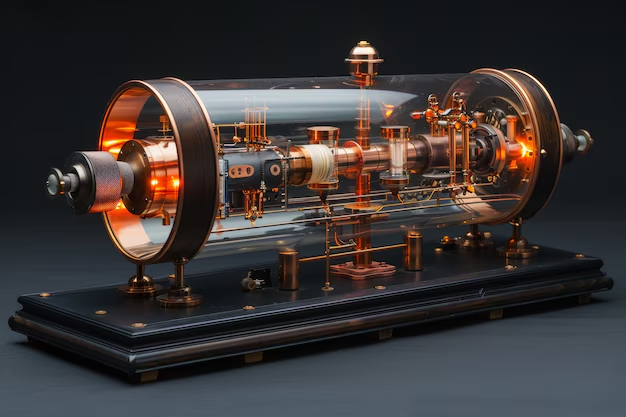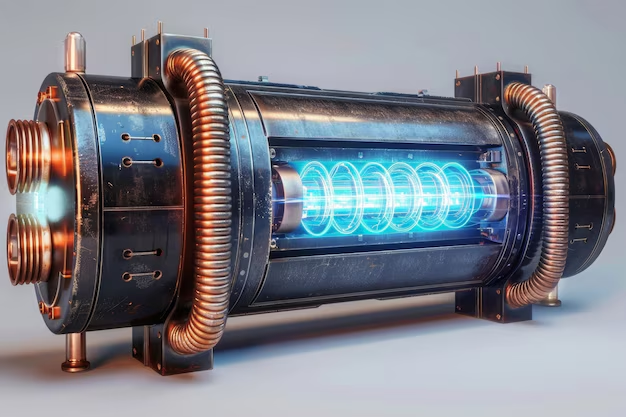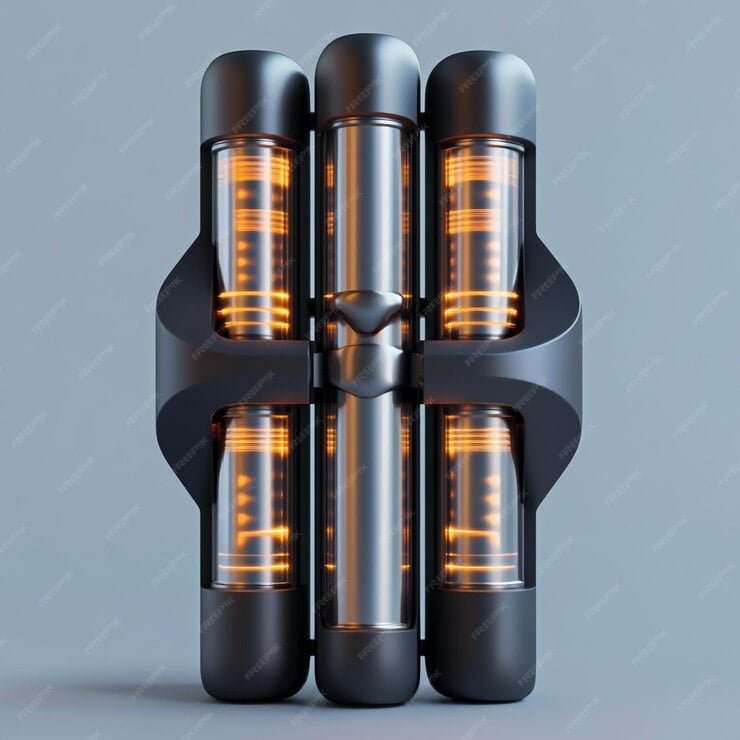Table of Contents
Nuclear Battery Nickel-63
Nuclear Batteries Using Nickel-63:
Nuclear batteries, also known as beta-voltaic cells, represent a significant advance in energy storage and generation technology. Unlike conventional batteries that rely on chemical reactions, nuclear batteries use the energy released by radioactive decay. One of the smartest isotopes used in these batteries is nickel-63. This isotope, known for its long half-life and stable decay properties, provides a reliable, long-lasting power source suitable for a variety of specialized applications. Source
What is Nickel-63?

Nickel-63 is a beta-emitting isotope of nickel with a half-life of about 100 years. This means that half of nickel-63 takes 100 years to decay, making it an unusually long-lived energy source. Beta particles emitted during the decay process are high-energy electrons that can be used to generate electricity.
How do nickel-63 nuclear batteries work?
Nickel-63 nuclear batteries work on the principle of beta-voltaic energy conversion. This process can be divided into several main steps:
1. Radioactive Decay:
– Nickel-63 undergoes radioactive decay, emitting beta particles (electrons) as it changes to a more stable isotope. This decay process is continuous and stable, providing a constant source of energy over time.
2. Energy Capture:
Beta particles emitted by nickel-63 are captured by a semiconductor material inside the battery, usually made of silicon or a similar material. When these high-energy electrons interact with the semiconductor, they form electron-hole pairs.
3. Power Generation:
– The movement of these electron-hole pairs creates the flow of electric current. This current is then harvested and can be used to power various devices. The entire process is highly efficient and occurs without any moving parts, making the batteries extremely durable and reliable.
4. Power Output:
– While the power output of a Nickel-63 nuclear battery is relatively low, the continuous and long-term nature of the energy supply makes it ideal for applications where small amounts of electricity are required continuously over many years or decades.
Advantages of Nickel-63 Nuclear Batteries
Nickel-63 nuclear batteries offer several unique advantages over conventional energy storage solutions, particularly in special areas:

1. Long operational life:
– Nickel-63’s 100-year half-life means these batteries can provide power for decades without needing replacement. This long operational life is unmatched by conventional batteries, which typically require frequent replacement or recharging.
2. High Energy Density:
– Nuclear batteries have a high energy density, meaning they can store large amounts of energy in a small amount. This is particularly beneficial in applications where space is limited, such as medical implants or in space missions.
3. Reliable under extreme conditions:
– Nickel-63 nuclear batteries are highly reliable, even in extreme environmental conditions. Unlike lithium-ion batteries, which can degrade or lose performance in extreme temperatures or high-radiation environments, nuclear batteries maintain their performance, making them suitable for remote locations, military use, and aerospace applications. Makes
4. Maintenance Free Operation:
– Due to their solid-state construction and lack of moving parts, Nickel-63 nuclear batteries require little maintenance over their operational life. This makes them ideal for use in situations where maintenance is difficult or impossible, such as deep space or inside the human body.
Advantages of Nickel-63 Nuclear Batteries
Given their unique properties, Nickel-63 nuclear batteries are used in a variety of specialized applications:
1. Medical Devices:
Medical Devices:Nickel-63 batteries are ideal for powering devices such as pacemakers and cochlear implants. Their longevity reduces the need for surgical battery replacement, which can be expensive and pose a risk to patients.
2. Aerospace and Space Exploration:
SATELLITES AND SPACECRAFT: The reliability and long life of nickel-63 nuclear batteries make them ideal for powering satellites, deep space probes and other spacecraft. In space, where solar energy may not always be available, these batteries ensure continuous operation during long missions.
Rovers and planetary exploration: On distant planets or moons, where atmospheric conditions are extreme and sunlight is limited, these batteries can provide a constant power source for exploration vehicles and scientific instruments. are
3. Remote Sensors and Monitoring Systems:
Environmental Monitoring: Remote sensors used to monitor environmental conditions in inaccessible or hazardous locations benefit from the long life and reliability of Nickel-63 battrey.These sensors can operate autonomously for decades without requiring maintenance or replacement.
Military and Surveillance Applications: In military settings, where long-term, stealthy, and maintenance-free power sources are required, Nickel-63 nuclear batteries can power surveillance equipment and communications equipment. , ensuring that they continue to function for a long period of time. .
4. Emergency and Backup Power:
Critical Infrastructure: In critical infrastructure, such as communication towers or emergency systems, where reliable and long-lasting power is required, Nickel-63 nuclear batteries can serve as backup power sources, during outages. or ensure continuous operation in remote Areas
5. Challenges and Considerations
While Nickel-63 nuclear batteries hold significant potential, some challenges must be addressed:
- Cost of Production: The extraction and refinement of Nickel-63 can be costly, which may limit the widespread adoption of these batteries compared to more established technologies like lithium-ion.
- Public Perception: The use of radioactive materials can lead to concerns about safety and environmental impact, even when designed with multiple safety features and safeguards.
- Limited Power Output: While Nickel-63 batteries provide steady, low power over time, they may not be suitable for high-energy applications where substantial power is required.
- Regulatory Hurdles: The use of radioactive materials in consumer products may face stringent regulations, affecting market entry and acceptance.
6. The Future of Nickel-63 Nuclear Batteries
As research continues, the future of Nickel-63 nuclear batteries looks promising. Ongoing advancements in materials science, semiconductor technology, and battery design may enhance their efficiency and cost-effectiveness. Here are a few potential developments:
- Enhanced Efficiency: Researchers are exploring ways to improve the efficiency of energy conversion in Nickel-63 batteries, potentially increasing their power output without compromising size or safety.
- Wider Adoption: As industries look for sustainable energy solutions, Nickel-63 nuclear batteries could gain traction in various sectors, including medical, aerospace, and military.
- Integration with Renewable Energy: Combining Nickel-63 batteries with renewable energy sources, such as solar or wind, could create hybrid systems that offer enhanced energy storage capabilities.
- Consumer Electronics: Although currently not common in consumer products, innovations in miniaturization and safety could open doors for Nickel-63 batteries in small electronics, wearables, and other applications.
Environmental and Safety Considerations
Although the advantages of Nickel-63 nuclear batteries are significant, there are significant environmental and safety considerations for this solution:
1. Prevention of Radiation:
– Nickel-63 is a radioactive material, which means that proper containment is necessary to prevent radiation exposure. However, the radiation emitted by Nickel-63 is relatively low-energy, and when properly contained within the battery, poses minimal risk to consumers or the environment.
2. SAFE DISPOSAL:
– After the battery has reached the end of its useful life, it must be safely disposed of or recycled to prevent environmental pollution. This usually involves returning the battery to the manufacturer or a specialized facility equipped to handle the radioactive material.
3. Regulatory Compliance:
The use of Nickel-63 nuclear batteries is subject to strict regulatory control. These regulations ensure that batteries are manufactured, transported, used and disposed of in ways that protect public health and safety.
FAQ: Nuclear Battery with Nickel-63
1. What is a nuclear battery with Nickel-63?
A nuclear battery with Nickel-63 is a type of radioisotope battery that uses Nickel-63 as the radioactive material. This battery generates electrical power through the decay of Nickel-63, which emits beta particles that are converted into electrical energy.
2. How does a Nickel-63 nuclear battery work?
The Nickel-63 nuclear battery works by harnessing the beta radiation emitted from the decay of Nickel-63. This beta radiation is captured and converted into electrical energy using a semiconductor material. The process is similar to other types of radioisotope batteries, but with Nickel-63 as the energy source.
3. What are the advantages of using Nickel-63 in nuclear batteries?
- Long Life: Nickel-63 has a relatively long half-life of about 100 years, providing a stable and long-lasting power source.
- Compact Size: Nuclear batteries can be made compact, making them suitable for applications where space is limited.
- Low Radiation Levels: Nickel-63 emits low-energy beta particles, which are less harmful compared to higher-energy radiation from other isotopes.
4. What are the potential applications of Nickel-63 nuclear batteries?
Nickel-63 nuclear batteries are particularly suited for applications that require long-lasting and reliable power sources. Potential applications include:
- Space Missions: They can provide power to spacecraft and satellites where conventional batteries would be impractical.
- Medical Devices: Used in medical implants or devices requiring long-term power without frequent maintenance.
- Remote Sensors: Ideal for powering sensors and devices in remote or hard-to-access locations.
5. Are there any safety concerns associated with Nickel-63 nuclear batteries?
Nickel-63 is considered to have low radiation hazards compared to other radioactive materials. However, proper handling and containment are essential to prevent exposure. Safety protocols are followed to ensure that the batteries are manufactured and used in a manner that minimizes any risks.
6. How is Nickel-63 obtained and used in batteries?
Nickel-63 is produced in nuclear reactors through the irradiation of Nickel-62. Once obtained, it is processed and incorporated into the battery design. The nickel isotope is encapsulated in a secure manner to ensure that its radioactive properties are contained.
7. What are the environmental considerations of using Nickel-63 nuclear batteries?
Nickel-63 nuclear batteries have minimal environmental impact when managed properly. The long half-life means that they are less likely to require frequent disposal. However, regulations and best practices are followed to handle and dispose of radioactive materials safely.
8. How does the performance of Nickel-63 nuclear batteries compare to other types of batteries?
Nickel-63 nuclear batteries offer several advantages, such as longer life and stable power output. Compared to conventional chemical batteries, they can provide power over extended periods without replacement. However, their use is typically limited to specialized applications where their benefits outweigh the higher cost and complexity.
9. Are Nickel-63 nuclear batteries commercially available?
As of now, Nickel-63 nuclear batteries are still largely in the research and development phase. They are not widely available commercially, but advancements in technology and manufacturing processes may lead to broader availability in the future.
10. Where can I find more information about Nickel-63 nuclear batteries?
For more information, you can refer to scientific publications, research institutions, or companies involved in the development of nuclear battery technologies. Industry news and technical journals may also provide updates on advancements and applications of Nickel-63 nuclear batteries.
Conclusion
Nickel-63 atomic batteries represent a significant advance in energy storage technology, offering unprecedented longevity, reliability and performance in specialized applications. From powering life-saving medical devices to enabling deep space exploration, these batteries provide an important alternative to traditional lithium-ion batteries, especially in situations where long-term, maintenance-free power is essential. As the technology continues to evolve, nickel-63 nuclear batteries could become an increasingly important component in a wide range of industries, helping to push the limits of potential in energy storage and power generation.


Thank you for your sharing. I am worried that I lack creative ideas. It is your article that makes me full of hope. Thank you. But, I have a question, can you help me?
Thank you for your sharing. I am worried that I lack creative ideas. It is your article that makes me full of hope. Thank you. But, I have a question, can you help me?